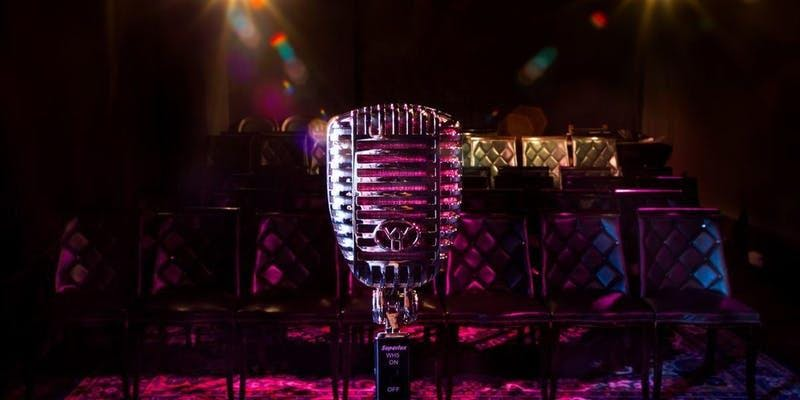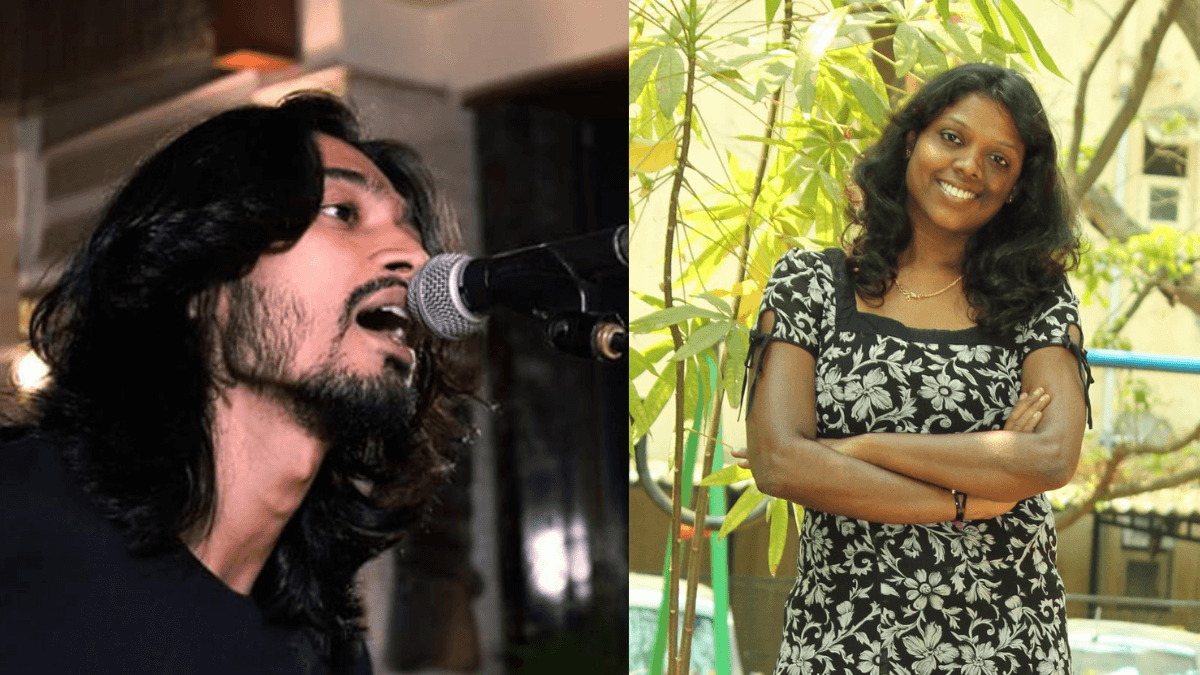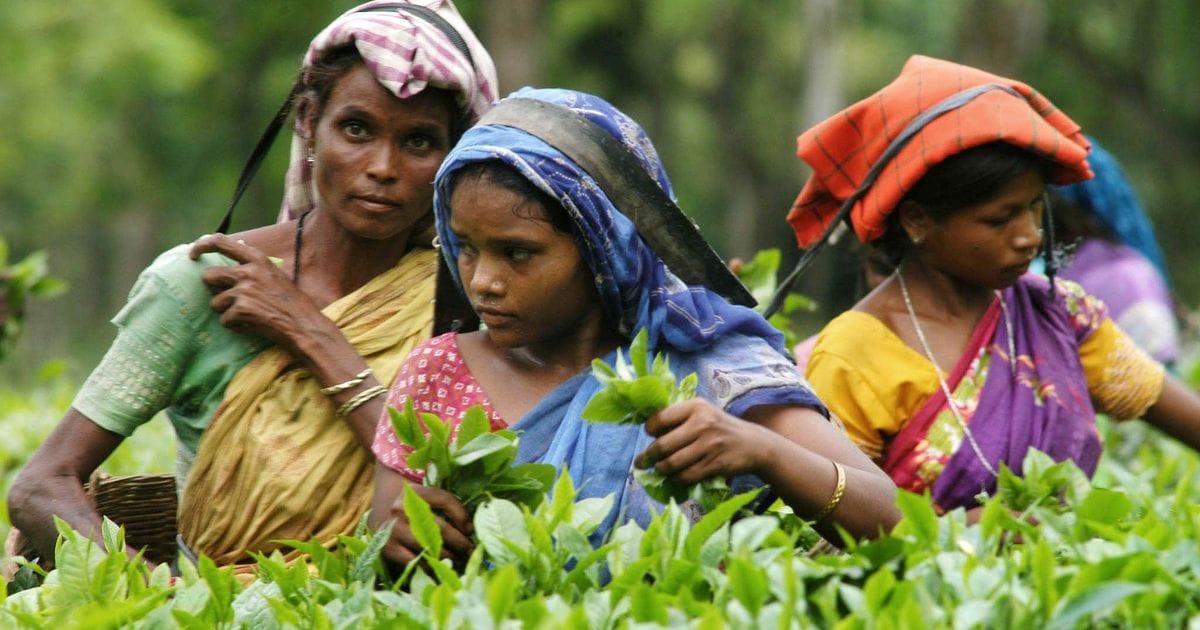Spoken word poetry can be loosely defined as ‘poetry intended for performance’. Though it may also be published on the page, the genre is rooted in oral traditions. In India, it has gained popularity in urban college and cafe spaces.
Increasingly today, poetry is becoming a striking method of self-expression. Spoken word poetry especially, reaches out to a wide audience base and builds a powerful platform for artists to speak on various social issues through their own identities and experiences.
Here’s a list of performers every spoken word enthusiast must listen to.
1. Alok Vaid-Menon (Preferred pronouns: they/them)
“… To live in America is to already attend a funeral with complete strangers/ How many ghosts does it take before a cemetery can call itself a country/ To live in America is to blame the dead for their own death…”
Alok Vaid-Menon is a writer and performer. Born in an Indian American family, their work talks about shame, trauma, and violence against trans and gender non-conforming people of colour. Vaid-Menon was recently the youngest recipient of the prestigious Live Works Performance Act Award, granted to 10 performance artists across the world. In 2017, they released their inaugural poetry chapbook, Femme in Public.
2. Uppa Tsuyo Bantawa (Preferred pronouns: he/him and she/her)
“… I guess in the end, we’re just trying to be true to our own identities/ the conflicts of body and soul is something impossible to explain but my body/ my body ain’t a universal war. I don’t have to pick sides for it. Somedays, I wake up a man/ Somedays, a woman/ and somedays nothing…”
3. Andrea Gibson (Preferred pronouns: they/them)
“… It’s true, what they say about the gays being so fashionable/ Their ghosts never go out of style/ Even life, it’s like funeral practice/
Half of us are already dead to our families before we die …”
Andrea Gibson is an American poet and activist. Their poetry focuses on gender norms, politics, social reform, and love. A four-time Denver Grand Slam Champion, Gibson finished fourth at the 2004 National Poetry Slam, and third at both the 2006 and 2007 Individual World Poetry Slam. Pole Dancing To Gospel Hymns, The Madness Vase, Pansy, Take me with You, Lord of the Butterflies are some of their published work.
Also read: Spoken Word Poetry and Resistance: Teaching Life, Sir.
4. Dr Abhijit Khandkar (Preferred pronouns: he/him)
“… And every time I don’t hate you enough, they think I don’t love my land enough as if that’s a prerequisite for anyone/ Every time I say something in your favour, I get told “You’re such an anti-national. You better go to Pakistan.” Hate is always easy/ It’s peace that takes a lot of work…”
Dr Abhijit Khandkar is the co-founder of The Rhyme Republic, a poetry and arts initiative. Born and brought up in a Buddhist household in Mumbai, he writes in English, Hindi, and Marathi. His work has been published in The Bombay Literary Magazine, New England Review of Books, Bookay literary compilation, amongst others. He traces his roots back to the rich Dalit, Bahujan cultural diaspora and tries to explore his identity in his works.
5. Safia Elhillo (Preferred pronouns: she/her)
“… Did our mothers invent loneliness or did it make them our mothers? Were we fathered by silence or just looking to explain away this gaping quiet? Is it wasteful or wistful to pray for our brothers in a language they never learned? Whose daughters are we if we grow old before our mothers …?”
Safia Elhillo is a Sudanese-American poet featured in TEDxNewYork, the BBC World Service, the South African State Theatre, and Red Bull’s Frontiers. Safia is a Pushcart Prize nominee, co-winner of the 2015 Brunel University African Poetry Prize, and winner of the 2016 Sillerman First Book Prize for African Poets. In 2018, she was also listed in Forbes Africa’s 30 Under 30 in the category Creatives. Her work has been translated into Arabic, Japanese, Estonian, and Greek.
6. Ocean Vuong (Preferred pronouns: he/him)
“because you were never holy/ only beautiful enough to be found with a hook
in your mouth
water shook
like sparks
as they pulled
you up
& sometimes your hand
is all you have
to hold
yourself
to this world…”
Ocean Vuong is a Vietnamese-American poet, editor, essayist and the author of Night Sky with Exit Wounds, which was a New York Times Top 10 Book of 2016, winner of the Whiting Award, the Thom Gunn Award, and the Forward Prize for Best First Collection. Vuong writes about queer desire, the body and personal transformation with near-spiritual grace and exquisite attention to detail.
7. Bharath Savithri Diwakar (Preferred pronouns: they/them)
“… Zero. Stop telling me what my gender is! Zero. Stop telling me what my gender looks like! Zero. Stop using my body as evidence against my own gender.”
Bharath Savithri Diwakar is a Bangalore based poet and storyteller. They write about not subscribing to gender norms, sexuality, mental health and body image issues. They were a mentor for India’s first National Youth Poetry Slam and frequently feature in Airplane Poetry Movement events. After the success of their solo show, Fluid, they performed at Spoken Fest in Bombay.
8. Emi Mahmoud (Preferred pronouns: she/her)
“… our parents came home with broken collarbones and a taste of fear carved into their skin and it was impossible to believe in anything/ Fear is the coldest thing in the desert and it burns you, bows you down to half your height and owns you and no one hears you because what could grow in the desert anyway?”
Emtithal “Emi” Mahmoud’s family was driven from Sudan by war when she was a child; most of her work revolves around the traumatic history of her country. She is the reigning 2015 World Poetry Slam Champion and 2016 Woman of the World Co-Champion. A UNHCR High Profile Supporter, a Yale Global Health Fellow and Leonore Annenberg Scholar, she dedicates her time to spreading understanding through poetry and advocacy, particularly for the cause of refugees and disadvantaged communities the world over.
9. Swastika Jajoo (Preferred pronouns: she/her)
“…See, the word ‘misfit’ does not fit too well with me/ These exercises of fitting in that you pass down as grammar books to ensure correct usage of pronouns are self-defeating. I’m comfortable in my own skin, sir. I don’t need you to stitch me another …”
Swastika Jajoo is a writer and poet. She worked enthusiastically for gender equality through a program called Gender Bender Aurangabad that she runs with her friend Meera where they exclusively designed sessions for high school children on feminism. She featured in The Bombay Review, Bangalore Review and more recently worked with Unerase Poetry. She has performed at multiple venues across India including an independent show called A Flower Behind My Grandfather’s Ear.
10. Chrysanthemum Tran (Preferred pronouns: she/her)
“… I’ve never recognised the boy in photographs. I stared at myself in mirrors and only saw where the scalpel’s touch could improve. I loved my body only in the language of dissection …”
Chrysanthemum Tran is a Vietnamese-American poet, performer & educator. She made history by becoming the first trans woman finalist of the Women of the World Poetry Slam. Chrysanthemum is a 2016 Rustbelt Poetry Slam Champion and 2017 FEMS Poetry Slam Champion. Her work has been featured in various publications including The Offing, The Blueshift Journal, Muzzle Magazine, and the Bettering American Poetry Vol. 2.
11. Angana Sinha Ray (Preferred pronouns: she/her)
“… We’ve begged for space so much, it might just put an astronaut to shame. But sometimes, sometimes I think I came out of the closet only to make space for your underwear…”
Angana Sinha Ray is a Delhi based performance artist. Currently working at NDTV, she is known to talk about love, family, gender and politics with an array of pop culture references. Katyayini, When your Daughter Brings Home a Dyke and Personally, I am political are some of her well-known pieces.
12. Danez Smith (Preferred pronouns: they/them)
“… I tried, white people. I tried to love you, but you spent my brother’s funeral making plans for brunch, talking too loud next to his bones. You interrupted my black veiled mourning with some mess about an article you read on Buzzfeed. You took one look at the river, plump with the body of boy after girl after sweet boi & asked ‘why does it always have to be about race?’ Because you made it that way!…”
Also read: The Poetry Of Meena Kandasamy: A Tool of Political Dissent
Danez Smith is an American poet and the author of the poetry collection [insert] Boy, which won the Lambda Literary Award for Gay Poetry and Don’t Call Us Dead: Poems, a finalist for the 2017 National Book Award for poetry. Smith presents an unflinching vision of what it means to be marginalised in America. Carefully handling complex topics including their HIV-positive diagnosis, police violence and race, they are also the founding member of the multigenre, multicultural Dark Noise Collective.
Featured Image Source: British Pakistan Foundation
About the author(s)
Srishti is a media student at TISS, Bombay. The best compliment she's ever received is "Madam, you write well and all but aap poori zindagi single rahoge"





Awesome! keep it up your work. you are providing precious information to users. i also heard
Mobile Packages providing same information. keep your work continue.